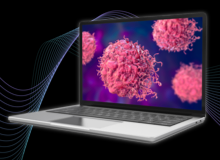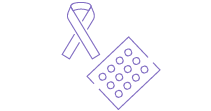Cancer Panels
Cancer panels using next generation sequencing (NGS) technology target specific genes or mutations relevant to a particular cancer phenotype. This makes it possible to perform high-throughput analysis of large genomic regions in a single efficient, cost-effective assay. Compared to traditional techniques, NGS provides significantly higher sensitivity, aiding in rare somatic mutation discovery – many of which are important cancer drivers.
We offer several cancer panels to form a complete solution, from experimental design to advanced bioinformatics analysis. Each panel can be combined with our genomics, transcriptomics, proteomics, and epigenomics services for an integrated multiomics approach, providing crucial insights into human cancer profiles and defining patterns that would have remained unseen and incomplete with just a single assay.
What is a Cancer Panel?
A cancer panel is a selection of genetic markers and accompanying genes that are commonly associated with cancer progression and analyzed using NGS. By examining the unique genetic alterations and mutations driving cancer behavior and progression, researchers can profile the genomic landscape of cancer cells, study the response to treatment at the cellular level, and identify potential therapeutic targets for personalized and targeted cancer treatment plans.
What is included in NGS Cancer Panels?
NGS cancer panels include specific gene targets that detect mutations (insertion, deletion, and substitution mutations) commonly associated with cancer phenotypes.
SERVICE OPTIONS
-
GENEWIZ from Azenta’s most comprehensive cancer panel, our pan-cancer panel offers coverage of all exons for 634 known tumor suppressors and oncogenes. The panel can be easily multiplexed to accommodate studies of virtually any size and is ideal for biomarker discovery and validation, as well as patient stratification.
-
GENEWIZ OncoGxOne™ Discovery cancer panels provide comprehensive genomic analysis for cancer research, biomarker discovery, and patient stratification for clinical discovery. These assays provide thorough assessments of 150 – 400 cancer genes of interest utilizing 19 distinct gene panels, each of which assays a specific cancer (organ) type.
-
Hotspot cancer panels assay multiple cancer types with a single gene panel to target well-characterized, small regions of known cancer genes (~48 genes). The small target region size produces a high depth of sequencing coverage per sample, even when multiplexing, to provide a cost-effective and efficient method for discovering rare somatic mutations.
Cancer Panel Sequencing Features & Benefits
Cancer Panel Comparison
| |
GENEWIZ Pan-Cancer Panel | GENEWIZ OncoGxOneTM Discovery Cancer Panels |
Illumina TruSeq© Amplicon Cancer Panel |
| Sequencing Platform | Illumina MiSeq or HiSeq | Illumina MiSeq or HiSeq | Illumina MiSeq |
| Cancer Types Assayed | Single gene panel assay for multiple cancer types |
19 distinct gene panels, each assays a specific cancer (organ) type | Single gene panel assays multiple cancer types |
| Genes Covered | 634 | ≈150 – 400 | 48 |
| Genomic Variation Detection |
|
|
|
| Target Regions | ≈ 2 Mb, consisting of exons and targeted promoter regions | ≈ 2 – 5.4 Mb, consisting of all exons, UTRs, and relevant intron regions | ≈35 Kb, consisting of mutational hot spots |
| Average Depth | >100x* | > 100x* | > 100x* |
| Target Enrichment | Twist Targeted Enrichment | Agilent SureSelect Targeted Enrichment | Illumina Targeted Amplicon Sequencing |
| DNA Input | > 100 ng | > 100 ng | > 250 ng |
| Sample Submission |
|
|
|
Sample Submission Guidelines
GENEWIZ accepts formalin-fixed, paraffin-embedded (FFPE) thin sections (slides), purified genomic DNA, or fresh, frozen samples for Cancer Panel projects. For detailed sample submission requirements please visit our Sample Submission Guidelines page.Deliverables
All customers receive their raw data as FASTQ files. Mutation discovery repeats and customizable data analysis packages are available on request.Technical Resources

Webinar | Non-Classical Sources of Tumour-Specific Antigen in Checkpoint Inhibitor Response
Developing immunotherapies for cancer can be difficult due to the variation of immune response from patient to patient. In this webinar, Dr. Litchfield from UCL Cancer Institute presents his team’s exploratory research using a multiomics approach to better understand the diversity of immune response to cancer and highlights their findings of an alternative source of a tumour-specific antigen in checkpoint inhibitor (CPI) response.

Webinar | Demystifying End-to-End DNA Sequencing Solutions
In this co-hosted webinar with Twist Bioscience, learn how researchers design custom panels to sequence deeply and efficiently into regions, genes, and organisms of interest, as well as gain a greater understanding on how targeted sequencing can be combined with the latest transcriptomics and proteomics tools to reveal even more insights.
NGS PLATFORMS
For information on our NGS platforms as well as recommended configurations of your projects, please visit the NGS Platforms page. GENEWIZ from Azenta does not guarantee data output or quality for sequencing-only projects.







